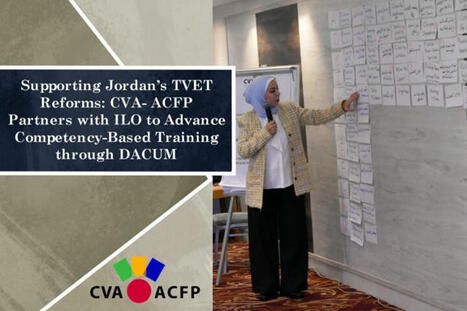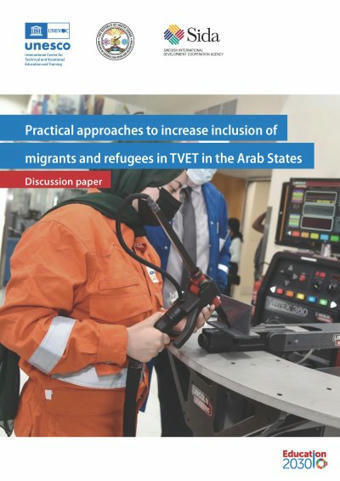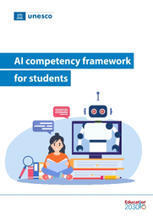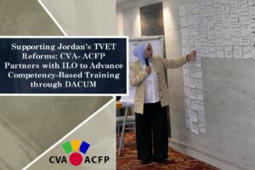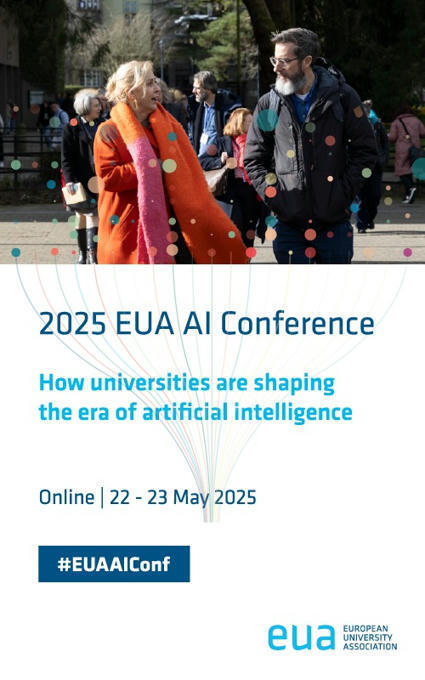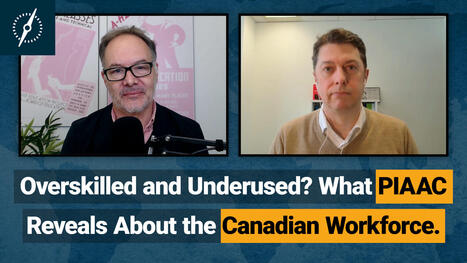 Your new post is loading...
 Your new post is loading...
Selections Supporting Jordan’s TVET Reforms: CVA-ACFP Partners with ILO to Advance Competency-Based Training through DACUM As part of a technical partnership with the International Labour Organization (ILO), the Canadian Vocational Association – Association canadienne de la formation professionnelle (CVA-ACFP) supported a key phase of Jordan’s vocational training reform by delivering two DACUM I training workshops in March 2025. These workshops were designed to strengthen the capacity of the Technical and Vocational Skills Development Commission (TVSDC) and align with Jordan’s National Human Resources Development Strategy (NHRDS), which emphasises competency-based learning, labour market relevance, and employability.
“This project exemplifies the role of DACUM as a globally recognized tool for workforce transformation,” said John Avery, President of CVA-ACFP. “It has been an honor to work with such dedicated professionals in Jordan as they move toward a more agile, responsive, and standards-based training system.”
Read the full article here ________________________________________________________________
The first ‘DACUM International’ vocational project: An unprecedented competency framework in French for peer support workers in eating disorders
Spring 2025 marks the culmination of an exceptional human and professional adventure: the completion of the competency framework for French-speaking peer support workers specializing in eating disorders (PA-TCA): the Référentiel de compétences pair-aidante TCA.
The framework has been delivered to the University Hospital Center of Nantes (France), which supported and accompanied this structuring initiative for the professionalization of peer support in eating disorders.
Over the past several months, a committed group of practitioners from Belgium, France, Québec, and Switzerland came together to co-construct this competency framework, with the support of Pierre Morin Formation Inc., and in full compliance with the CVA-ACFP quality charter.
Through online workshops, rich exchanges of experiences formalized general areas of competency, professional tasks, key actions, and transversal skills mobilised by peer support workers, who play a crucial role in the recovery journeys of people living with eating disorders.
Read the full article here
___________________________________________________________________
Bruno Chauvel's pick of the month, DACUM francophone trainer and CVA-ACFP Board Member
Canada. Canadians need better skills training and recognition to tackle 21st century challenges
Source: Policy Options
In this timely article, the authors call for a much-needed shift in Canada’s skills development and recognition systems. While Canada’s education system performs respectably in international assessments -notably, Canadians are strong performers in adaptive problem-solving- the article underscores a lack of flexible, employment-relevant learning pathways and credential recognition.
This analysis builds on the 2024 report prepared by the Conference Board of Canada for the Future Skills Centre, which highlights the urgent need to better align skills development with economic resilience and national productivity. The message is clear: Canada must do more to recognise the skills its people already have - and make them count across sectors and provinces.
At the Canadian Vocational Association (CVA), we believe this transformation must begin with competency-based approaches. Tools like DACUM enable the transparent identification of job-specific competencies and support the design of modular, adaptable training and certification pathways.
Canada must be able to strengthen the versatility, comparability, and portability of skill sets across provinces — not by enforcing uniform training routes, but through robust and well-articulated upskilling and reskilling strategies, underpinned by shared occupational mappings and clearly defined blocks of competencies to certify. These foundational elements are essential to enable recognition and mobility across diverse provincial systems, while still allowing contextual flexibility.
For educators, employers, and policy leaders alike, this article offers a timely reminder: how we recognise skills is just as vital as how we develop them.
_________________________________________________________________ The Newsletter Interested in receiving the CVA/ACFP free bi-monthly Newsletter? Our #DACUM training calendar 2025 For more information on DACUM or write to dacum@cva-acfp.org Join our online community - Scoop.It! @Canadian Vocational Association / Association canadienne de la formation professionnelle
This joint Cedefop-ETF policy brief provides an overview of vocational education and training (VET) policy developments from 2021 to 2025 in the EU-27, Norway, Iceland and five candidate countries (Albania, Montenegro, North Macedonia, Serbia, and Türkiye).
It highlights countries’ activities to advance EU priorities in making national VET systems agile, flexible, excellent, attractive, inclusive and quality-assured, with selected examples illustrating progress across EU Member States and candidate countries.
Findings from Cedefop and ETF monitoring and analysis point to key areas requiring continued efforts in the coming years, aligned with new European priorities.
Coordinating and sustaining policy effort and resource allocation amid political change
Strengthening labour market involvement in VET and lifelong learning policies
Advancing digital and green transitions in VET
Boosting VET attractiveness and participation
Improving VET teacher and trainer competences
Expanding lifelong learning opportunities for all
The Artificial Intelligence revolution is transforming higher education at an unprecedented pace, offering innovative opportunities to personalize university learning experiences, support professors and researchers in their daily tasks, and optimize the management of educational institutions. Our new report, “Artificial Intelligence Revolution in Higher Education: What You Need to Know,” brings together the main advances driven by artificial intelligence (AI), a powerful tool that offers practical solutions: • For university students: Personalized tutoring systems, adaptive learning platforms, and immediate feedback tools tailored to the needs of each degree program and specialization. • For faculty and researchers: Academic planning assistants, automated assessment tools, and advanced research resources that enhance scientific production and teaching quality. • For higher education institutions: Early warning systems, resource optimization, and institutional management platforms that improve efficiency, student retention, and educational quality.
Migration is increasing due to political and economic instability, with the Arab States experiencing a substantial rise in refugees, migrants, and internally displaced persons. In response, this study, initiated by UNESCO-UNEVOC in collaboration with UNRWA, examines the barriers to accessing Technical and Vocational Education and Training (TVET) for migrants and refugees, while also exploring promising practices and interventions in the region that support their inclusion.
Based on an extensive literature review and interviews with key stakeholders, the study reveals that with adequate support, such as through UNESCO/UNEVOC’s capacity building pilot projects, TVET institutions can make meaningful progress in addressing inclusion challenges. However, the study emphasises the need for both state and international efforts to establish an enabling environment that supports inclusive practices. This includes removing key barriers, such as legal and financial obstacles, that hinder TVET institutions from effectively implementing inclusive practices and prevent learners from fully participating in and benefiting from TVET.
In Mozambique, where violence and displacement have upended countless lives, a new initiative is harnessing the power of technical and vocational education and training (TVET) to foster peace and social cohesion. Cabo Delgado, Mozambique (ILO News) – As violence and displacement continue to disrupt lives in northern Mozambique, a new effort is taking shape to turn technical and vocational education and training (TVET) into catalysts for peace. Working in a fragile context, the International Labour Organization (ILO), in collaboration with the National Directorate for Local Economic Development (DNDEL) and with funding from Sida (Swedish cooperation) and the International Fund for Agricultural Development (IFAD), has launched a process to adapt its global guide "Promoting Social Cohesion and Peaceful Coexistence in Fragile Contexts through TVET" to the Mozambican reality. The project comes in response to the ongoing insurgency that has gripped Cabo Delgado since 2017, displacing over one million people, many of whom are now living in precarious conditions in neighbouring provinces like Nampula, Niassa, and safer districts within Cabo Delgado. Youth and women among the internally displaced populations (IDPs) are particularly vulnerable—facing not only limited access to livelihoods but also trauma, discrimination and social exclusion. The adaptation of the guide is rooted in the urgent need to respond to the consequences of displacement and social fragmentation in northern Mozambique. As IDPs settle in new communities, tensions can arise from competition over resources, cultural misunderstandings, and lack of integration mechanisms. Without targeted interventions, these tensions risk undermining social fabric and stability. Turning TVET into a tool for healing
Spring 2025 marks the culmination of an exceptional human and professional adventure: the completion of the competency framework for French-speaking peer support workers specializing in eating disorders (PA-TCA): the Référentiel de compétences pair-aidante TCA.
The framework has been delivered to the University Hospital Center of Nantes (France), which supported and accompanied this structuring initiative for the professionalization of peer support in eating disorders.
Over the past several months, a committed group of practitioners from Belgium, France, Québec, and Switzerland came together to co-construct this competency framework, with the support of Pierre Morin Formation Inc., and in full compliance with the CVA-ACFP quality charter.
Through online workshops, rich exchanges of experiences formalized general areas of competency, professional tasks, key actions, and transversal skills mobilised by peer support workers, who play a crucial role in the recovery journeys of people living with eating disorders.
This collective dynamic rigorously followed the CVA-ACFP DACUM methodology, which is recognized for ensuring the quality of competency frameworks. Notably, this project represents the first ‘DACUM International’ vocational initiative, as envisioned by Pierre Morin, aiming to expand DACUM quality standards beyond borders and to build ‘global’ competency frameworks.
Every stage of the process adhered to a high level of methodological rigor, from the initial mapping to the detailed analysis of professional competencies.
Respecting the quality standards of CVA-ACFP has ensured the reliability and relevance of this framework, paving the way for future professional recognition of the role.
A heartfelt thank you to all the contributing practitioners for their generosity and exemplary commitment.
This framework is much more than just a document that ‘codifies’ a profession: it represents a cornerstone for the recognition and structuring of this emerging profession, essential to public health systems and to meeting the needs of individuals living with an eating disorder.
Together, we have demonstrated the power of collective action to advance the professionalization of this role and prepare for the next steps toward certification and official recognition!
This article is published in memory of Pierre Morin who passionately supported this project.
Bruno Chauvel
Trainer – French-speaking DACUM Seminars
Canadian Vocational Association (CVA) 📚 For more information on #DACUM here and here
or communicate with Mr Bruno Chauvel (chauvel@cva-acfp.org)
dacum@cva-acfp.org
✍ To register for a workshop here We also invite you to: Please share this information on to any interested parties in your organization.
CVA’s PICK OF THE MONTH
Canada. Bridging the Gap: Developing a Flexible Learning Platform for Reskilling and Upskilling
Key Insight
1. Tailoring micro-credentials to the needs of individual learners holds the promise of being more cost effective and motivating.
2. Engaging employers as key partners in the development of micro-credentials is essential to making them relevant.
3. While engaging potential technology partners early in the project planning process is important, it is equally crucial to remain flexible and be willing to adjust or even change partners to meet shifting needs.
En français. Canada. Combler les lacunes : mise au point d’une plateforme d’apprentissage flexible pour la rééducation et le perfectionnement professionnels
Source: Future Skills Centre
Comment. As Canada prepares to strengthen its own skills development ecosystem, this article explores how flexible, modular micro-credentials (co-designed with employers) can build national resilience, reduce reliance on foreign standards, and support interprovincial collaboration. A timely read for the DACUM community!
Bruno Chauvel
Trainer – French-speaking DACUM Seminars
Canadian Vocational Association (CVA) The Newsletter Interested in receiving the CVA/ACFP free bi-monthly Newsletter? Our #DACUM training calendar 2025 For more information on DACUM or write to dacum@cva-acfp.org Join our online community - Scoop.It! @Canadian Vocational Association / Association canadienne de la formation professionnelle
Explore competency-based education and its impact on modern learning. This post delves into key concepts, terminology, and real-world applications. We'll examine nationwide implementation, successful models, and strategies for educator development. Gain insights into how this approach is reshaping education for today's learners.
Defining Competency-Based Education
Competency-based education is a learning approach that focuses on what students can do rather than how long they spend in a classroom. It's all about making sure students actually master skills and knowledge, not just sit through lectures. In this system, students move forward when they show they've learned something, not when a certain amount of time has passed.
Unlike traditional education, where everyone moves at the same pace, competency-based education lets students learn at their own speed. Fast learners can zoom ahead, while those who need more time can take it without falling behind. It's like having a personalized learning path for each student.
This approach also changes how we think about grades. Instead of A's, B's, and C's, students get feedback on specific skills they've mastered. Teachers act more like coaches, helping students understand what they need to learn and how to get there. It's a big shift from the old "one-size-fits-all" way of teaching.
Competency-based education is shaking things up in schools and colleges. It's making learning more about real skills and less about just showing up to class. As we move forward, this approach could change how we think about education and what it means to be "educated."
Advances in artificial intelligence (AI) promise to improve productivity significantly, but there are many questions about how AI could affect jobs and workers.
Recent technical innovations have driven the rapid development of generative AI systems, which produce text, images, or other content based on user requests - advances which have the potential to complement or replace human labor in specific tasks, and to reshape demand for certain types of expertise in the labor market.
Artificial Intelligence and the Future of Work evaluates recent advances in AI technology and their implications for economic productivity, the workforce, and education in the United States. The report notes that AI is a tool with the potential to enhance human labor and create new forms of valuable work - but this is not an inevitable outcome. Tracking progress in AI and its impacts on the workforce will be critical to helping inform and equip workers and policymakers to flexibly respond to AI developments.
From the AI boom to the 2024 Budget, employees in 2025 will need to be more strategic than they’ve ever been to get, and stay ahead, in their respective industries. According to a report by Telegraph Money, job vacancies in 2024 have fallen to pre-pandemic levels, by 13.5% to be specific, the lowest since March-May 2021.
As the 2024 Budget means higher operating costs for businesses, more employers are cutting back on hiring, but where does this leave an employee in 2025? Keep reading to learn what skills, sectors and jobs you should focus on to put your career at an advantage.
Amidst war, Ukraine’s resilience is evident not only in its ability to withstand external challenges but also in its commitment to rebuilding from within. Vocational education, once overlooked, is now at the forefront of the country’s recovery, playing a crucial role in reconstructing and stabilising the economy.
The SDC-funded EdUP project, implemented by Swisscontact in Ukraine, is driving innovation and collaboration, fostering collaboration by bringing together businesses, vocational education institutions, and government stakeholders to equip the next generation with the skills needed to rebuild the nation. Our mission is clear: to ensure that Ukrainian youth and workers have access to high-quality, market-relevant training that meets the demands of industries today and in the future.
Based on an analysis of Bangladesh and Switzerland, and focusing on vocational education and training, the article discusses why qualifications frameworks often do not have the impact that policymakers expect them to have. Drawing on an historical-institutionalist reading of the literature, it argues, in general terms, that this lack of effective implementation stems from existing institutions and from key actors in the respective VET systems who cling to and benefit from these existing institutions. On a more specific level, the article adds to this institutionalist reading by arguing that ineffective implementation of NQFs needs to be interpreted in the broader context of educational expansion and the social conflicts manifested in this process. Particular attention should be paid to the phenomenon of academic drift, which, as the two case studies suggest, affects the implementation of NQFs in different ways.
From industry trends to competencies within TVET
This publication proposes approaches to facilitate the dual transition in hospitality and tourism, structured around the identification of emerging green and digital competencies in a timely manner, their integration into future-oriented curricula, and their effective implementation in TVET. Drawing on practical examples from Africa, Asia-Pacific and Europe, it offers actionable recommendations for policymakers and practitioners.
|
Abstract
The AI and the Future of Skills (AIFS) project at the OECD’s Centre for Educational Research and Innovation (CERI) presents a framework to systematically measure artificial intelligence (AI) and robotic capabilities and compare them to human skills. This chapter gives an overview of AI performance across each of the OECD’s AI Capability Indicators. The first section introduces a comparative table and provides the information needed to understand it. The table indicates the current level of AI in each domain and describes the sorts of capabilities possessed by cutting-edge AI systems in November 2024. Below the table, a brief commentary explains the rationale for the OECD’s expert group rating of AI systems at that level and the capabilities that would allow AI systems to progress to the next level.
The UNESCO AI competency framework for students aims to help educators in this integration, outlining 12 competencies across four dimensions: Human-centred mindset, Ethics of AI, AI techniques and applications, and AI system design. These competencies span three progression levels: Understand, Apply, and Create. The framework details curricular goals and domain-specific pedagogical methodologies.
Generative AI could change — not just replace — jobs in Canada
In vocational education (VE), as in other forms of education, teachers’ assessment competence is considered an integral part of their teaching competence and is, therefore, critical for the quality of assessment practices (Brookhart 2011; Popham 2009). This implies that competent teachers perform adequately within authentic assessment situations (Mulder 2014; Vitello et al. 2021). Assessment competence includes both practical skills and knowledge, as well as attitudes and perceptions that influence teachers’ behaviour (Xu and Brown 2016). It therefore includes teachers’ perceptions of what is important to know and be able to do to act competently in assessment practices. For example, when teachers perceive incorporating new assessment methods into their practice as highly important, they may actively engage in activities to update and adapt their assessment competence.
In literature, teachers’ assessment competence is approached as a contextual and social process (Pastore and Andrade 2019; Willis et al. 2013; Xu and Brown 2016). While definitions of assessment competence offer a foundational framework (Herppich et al. 2018; Pastore and Andrade 2019; Xu and Brown 2016), teachers give meaning to their assessment competence when enacted in their assessment practice. To illustrate, when teachers perceive the implementation of generative AI in assessment as highly important, they are likely to hold the opinion that assessment-competent teachers should be able to integrate generative AI into their assessment practice in responsible and informed ways. In this way, their perceptions, shaped by their professional context, inform how they understand assessment competence in practice.
While teachers’ perceptions of assessment competence are thus important, studies specifically addressing teachers’ perceptions are scarce. In addition, this research often relies on small sample sizes and primarily involves expert teachers within the field of assessment (Deneen and Brown 2016; Feola et al. 2023; Latif and Wasim 2022). Moreover, research on assessment competence typically focuses on the purposes and objectives of assessment in classroom situations (Brookhart 2011; Fulmer et al. 2019), without addressing the broader contexts beyond classroom situations. This broader context encompasses the wider educational context, including professional competence standards, educational policies, and learning outcomes of the study program as a whole (Chan and Luo 2021). VE teachers may be involved in designing study programs or in policy-making processes, positioning them as active contributors to assessment practices at the program or institutional level (Baartman et al. 2007; Lock et al. 2018; Stiggins and Duke 2008). Accordingly, VE teachers frequently engage in assessment-related roles that extend beyond the classroom (Kremmel and Harding 2020; Leonardsen et al. 2022). They may be involved in curriculum development, serve on examination boards, or develop assessment policies. This suggests that perceptions of what is important for assessment competent teachers are shaped by a broader context than just classroom situations.
In the context of VE, teachers assess whether students are ready to start in vocational practice. VE assessment practices are grounded in the specific vocational practice for which students are being educated, focusing on practical situations and real-life scenarios (Bruijn et al. 2017; Lahn & Nore, 2019). Consequently, the cultures of vocational fields and practices are reflected in these assessment practices. These cultures shape not only what is assessed and how, but also how teachers perceive the importance of assessment competence. However, it remains unknown whether teachers perceive the importance of assessment competence differently across various contexts, which this study operationalizes by different vocational fields, assessment roles, or situations.
This study aims to map VE teachers’ perceived importance of assessment competence. The study was conducted in the Netherlands among teachers of professional studies in Universities of Applied Sciences. A large-scale study was conducted to represent a broad population of teachers, including various vocational fields, roles, and situations, allowing for the exploration of differences across these contextual variables.
Amman, The Hashemite Kingdom of Jordan – May 2025 – As part of a technical partnership with the International Labour Organization (ILO), the Canadian Vocational Association – Association canadienne de la formation professionnelle (CVA-ACFP) supported a key phase of Jordan’s vocational training reform by delivering two DACUM I training workshops in March 2025. These workshops were designed to strengthen the capacity of the Technical and Vocational Skills Development Commission (TVSDC) and align with Jordan’s National Human Resources Development Strategy (NHRDS), which emphasises competency-based learning, labour market relevance, and employability. “This project exemplifies the role of DACUM as a globally recognized tool for workforce transformation,” said John Avery, President of CVA-ACFP. “It has been an honor to work with such dedicated professionals in Jordan as they move toward a more agile, responsive, and standards-based training system.” Building capacity through DACUM I and facilitator certification Under the leadership of John Avery, President of CVA-ACFP and Certified DACUM Trainer, the mission delivered: - Two five-day DACUM I facilitator workshops, serving a total of 23 participants;
- A Training Needs Assessment (TNA) process to guide future competency-based programming;
- Full adaptation and bilingual (English-Arabic and Arabic-English) validation of training resources in partnership with local co-facilitators;
- The enrolment of all 23 participants in the CVA-ACFP’s International Certification Program for DACUM Facilitators.
The training was preceded by two targeted information sessions: one for senior executives and technical advisors at TVSDC, and another for the prospective DACUM facilitators. These sessions introduced participants to the DACUM approach as a cornerstone of demand-driven workforce development. Milestones ahead - Registration of participants in the international certification track;
- TNA for DACUM II (in development).
These deliverables directly support the implementation of the ILO-Jordan agreement and pave the way for the upcoming DACUM II workshop and related coaching sessions later this year. In Support of Jordan’s National Workforce Vision Jordan is transforming its Technical and Vocational Education and Training (TVET) system through the implementation of the National TVET Strategy 2023–2027 (in Arabic only), developed by the Technical and Vocational Skills Development Commission (TVSDC). This strategy focuses on three main pillars: enhancing governance and institutional development, improving the quality and relevance of TVET provision, and facilitating the transition to employment. These efforts are aligned with Jordan’s Economic Modernisation Vision 2022–2033, aiming to better match TVET outcomes with labour market demands and socio-economic development goals. The CVA-ACFP’s DACUM methodology directly supports these national priorities by providing a structured approach to occupational analysis, ensuring that training programs are closely aligned with the competencies required in the workforce. A Partnership Anchored in Shared Values The CVA-ACFP’s collaboration with ILO and the Government of the Hashemite Kingdom of Jordan demonstrates a shared commitment to quality training, professional certification, and inclusive workforce development. As the project enters its next phase, this partnership will continue to support Jordan in achieving its national TVET goals and delivering long-term benefits for both learners and employers. These photos showcase the participatory energy of the workshops. Bruno Chauvel
Trainer – French-speaking DACUM Seminars
Canadian Vocational Association (CVA) chauvel@cva-acfp.org For more information on DACUM https://cva-acfp.org/training-and-workshops/ & https://cva-acfp.org/dacum-plus-services/ or write to dacum@cva-acfp.org
Micro-credentials (MCs) are regarded as one of the most significant developments in global higher education in the post-pandemic era. Unlike traditional academic qualifications earned over a longer period of time, MCs are based on outcomes acquired through a short, transparently assessed course or module over a few weeks.
One of the benefits of MCs is that they provide a flexible approach to developing career paths and upskilling in the jobs market, thus enhancing learners’ employability.
In response to this emerging trend, Asian governments have encouraged universities to provide a variety of MCs to existing students and workers. Yet, several issues are challenging the implementation of MCs in the region, such as the lack of a clearly shared definition; the limited credibility of some MC providers; and the lack of incorporation of MCs into national quality assurance systems.
Given that MCs can be offered by different providers in different ways, ensuring consistent quality is complicated.
The VET Practitioner Resource draws on VOCEDplus, NCVER products and external links to present a range of information designed to support vocational education and training (VET) practitioners in their teaching and assessment practice and in undertaking research.
The VET Practitioner Resource is a living resource that NCVER continues to develop and update on an ongoing basis.
In a globalized world, education, especially vocational education and training, is becoming increasingly important for economic growth and social stability. Internationalization has become a central topic in this field and can be considered a key aspect for a sustainable education system.
Many countries, including developing and newly industrializing countries as well as countries with school-based vocational education and training systems, are undertaking reform efforts in order to meet the growing qualification requirements and increase the employability of young people. The increased competitiveness of the TVET system that this aims to achieve is set to influence the competitiveness of local SMEs in the country as well.
One example of such reform efforts is Georgia. Otto von Guericke University Magdeburg is supporting the Georgian vocational training reform by building up and increasing capacities for vocational training research. Local universities are brought together with the Georgian Ministry of Education, business stakeholders and German TVET experts in order to achieve sustainable and multiplicative effects.
The project includes the establishment of a doctoral program at the partner university in Tbilisi. The results will be summarized in this book, combining the national perspective with international development trends in the academization of teachers in vocational education and training.
Artificial intelligence has become the new geopolitical fault line – and universities now sit squarely on it. Washington’s export-control regime blocks sales and technical support for advanced AI chips to China; Beijing, for its part, requires recommendation algorithms and generative-AI models to be filed with – and in some cases to be licensed by – state regulators; and Brussels has approved the world’s first cross-sector ‘trustworthy AI’ act.
These rival rule-sets decide who may collaborate, what data may cross borders and which discoveries become strategic assets.
Universities that misread this terrain risk forfeiting funding, partnerships and, ultimately, academic freedom itself. How can universities protect – and even strengthen – their missions amid such a fragmented AI policy regime?
First, we need to map the fault lines of today’s competitive landscape of national AI rules, based on our analysis of national AI policy.
Second, we need to arm university leaders with four lenses – structural, political, human-resource-related and symbolic – to navigate the turbulence, reinforcing governance, recalibrating diplomacy, retraining talent and reaffirming ethical purpose.
For many young women in construction, their journey begins with uncertainty. The physically demanding tasks and the male-dominated industry can feel overwhelming and challenging. Daria Mahera, a third-year student training to be a painter-plasterer and tiler, was no exception. "The first year of training was tough. I doubted my choice and thought, 'Why am I doing this?'" she recalls.
But as she received guidance from instructors and gained experience, her perspective shifted. Over time, Daria not only gained confidence in her skills but also developed a passion that led her to dream bigger – towards a future in design and architecture.
Her transformation is just one example of how the EdUP project is equipping young women in Ukraine with the skills, knowledge and confidence to thrive in construction careers.
Before our show starts today, I just wanna take a minute to note the passing of Professor Claire Callender, OBE. For the last two and a half decades, she’s been one of the most important figures in UK higher education studies, in particular with respect to student loans and student finance. Holder of a joint professorship at UCL Institute of Education and Birkbeck University of London, she was also instrumental in setting up the ESRC Centre for Global Higher Education, of which she later became deputy director. I just want to quote the short obituary that her colleague Simon Marginson wrote for her last week after her passing from lung cancer. He said, “What we’ll remember about Claire is the way she focused her formidable capacity for rational thought on matters to which she was committed, her gravitas that held the room when speaking, and the warmth that she evoked without fail in old and new acquaintances.”
|


 Your new post is loading...
Your new post is loading...
 Your new post is loading...
Your new post is loading...




